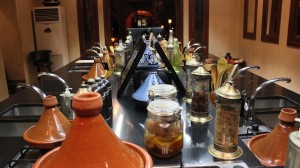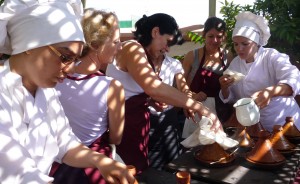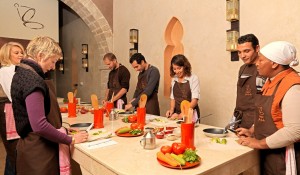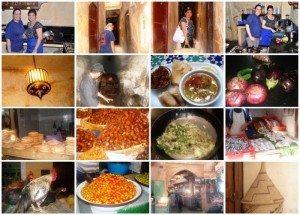Learning some of the basics of Moroccan cooking can be an enjoyable experience and adds to your own culinary skills back home. Many riads offer cookery classes for their clients during their stay. These usually begin with a trip to the souk accompanied by one of the staff to buy produce and spices. In contrast to shopping at home everything is bought fresh, for home-cooking. The market stalls include piles of spices, and fresh fruits, nuts and fine local vegetables all beautifully laid out with the fragrance of mint and cilantro . Shopping in the souks of Morocco is a keen sensory experience, as well as a chance to experience local daily life as buyers and sellers haggle over prices.
Learning how to use spices is a key element in Moroccan cuisine. Salt, pepper, ginger and turmeric are essential to many tagines and stews. Make sure you pick up plenty of ras el hanout(the best spices in the store) so that you can cook up authentic Moroccan dishes back home, and consider stocking up on saffron too. Charmoula is a popular Moroccan sauce that can be used on everything from fish to vegetables. Coriander and cumin are the leaders of the spice mix. The spices are ground with garlic, and freshly squeezed lemon juice. Spices and pepper can be added for taste to suit individual preference.
When you return from the souk you can begin the cooking class under the instruction of an expert chef. Each person in the group is allotted specific tasks in the cooking process and a after a lesson or two you should know how to dress a salad, create a main course and a desert. Longer intensive courses are available and your travel agent should be able to advise you on this. Learning to cook in a Moroccan kitchen gives you a unique insight in to family daily life. Finally you get to sample and enjoy your joint efforts over lunch or dinner.
Some examples of Moroccan dishes include tangines, slowly cooked meat and vegetable dishes in a pot with a cone shaped lid that gently cooks fish, beef, dried fruits and olives. Vegetarians can enjoy vegetable tagines. Other recipes include lamb with prunes and almonds, chicken with lemon and fruits are blended with meat dishes such as lamb with pears.
You can learn how to make couscous, which is small grains of semolina which is steamed and eaten with a spicy broth and vegetables and meat. Moroccan families gather after Friday prayers to get together over a couscous.
Harira is a renowned traditional soup made with tomato paste lentils, chick peas and spices and sometimes pieces of lamb. It is served with dates when Moroccans break their fast during Ramadan.
Moroccan salads can be served as a starter or as a side dish and orange blossom water is sometimes used in salads. Moroccan cuisine has strong aromatic qualities. The Al Fassia restaurant in Marrakech serves several dishes of salads as a starter and to appreciate the art of salad making and superb tangines it’s a wonderful place to experience the very best in Moroccan cuisine before you start your own efforts.
Other dishes include Bastilla which is pastry dusted with cinnamon and stuffed with sweet and savoury ingredients including pigeon. It can be served as a starter of a main course. Birouettes are small triangles of pastry with savoury and spicey fillings such as minced lamb or fettah cheese with spinach. It can also be a dessert with groundnuts and honey. Moroccan pastries are served with honey . Learn to bake Moroccan bread which often has added spices and how to make Moroccan mint tea to accompany the meal.
Travel Exploration Morocco’s Recommendations for 4 of Morocco’s Top Cooking Classes are:
La Maison Arabe – A long standing name in Marrakech for it’s restaurant and boutique, luxury Riad, La Maison Arabe boasts one of the most professional and detailed cooking classes in Morocco. Headed by a Dada Chef guests experience a stroll through the souks, learn how to purchase spices, then cook up a three-course meal. Options of wine pairings to match and everyone departs with a complimentary tajine. This is the cooking workshop for professionals and also for those who love the art of cooking.
Riad Monceau – Haute Cuisine at this French owned Riad and cooking class is what can be prized most. An elegant and charming setting within old Marrakech’s Red Hamra city Riad Monceau’s owner Ludovic Antoine offers guests a top notch class. With their widely esteemed cook book, local chef and hands on approach this is a great way to discover the art of Moroccan cooking in Marrakech.
Cafe Clock – Set within the old Fes Medina just down the street from Maimonides is the ever so hip and charming Cafe Clock. Cafe Clock allows participants to select their own menu, then takes them on an authentic shopping expedition in the Fes souk where you choose your own ingredients, learn about bread baking and other details of Moroccan cuisine. Cafe Clock offers a Moroccan bread baking workshop or a one-day patisserie class. Complimented by their cafe which is an active place for locals and foreigners Cafe Clock serves one of the most exciting cooking workshops in Morocco.
L’Atlier Madada Mogador – In Seaside Essaouira this fabulous cookery workshops is perfect for small groups who collaborate together in a charming Riad near Morocco’s seacoast. They prepare a full meal before sitting down together to dine in a traditional setting. A walking tour option in the souks after is a nice add on to this day.
For More Information on Moroccan Cooking and Moroccan Cooking Classes
Morocco’s Imperial Cities, Seaside Resorts,Sahara Desert,Berber villages, A Taste of Morocco, Magical Kasbahs, Ruins & Waterfalls, Absolute Morocco, The Best of Marrakech, Fes, and Ouarzazate






